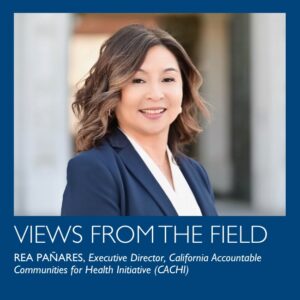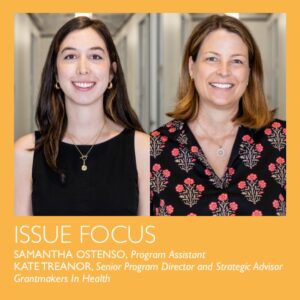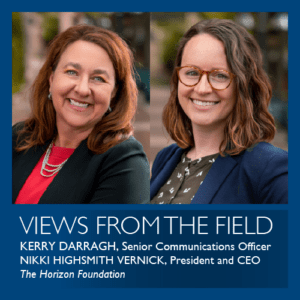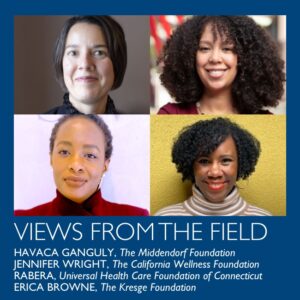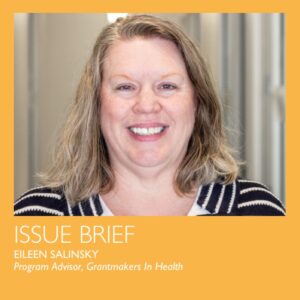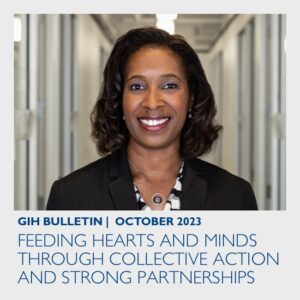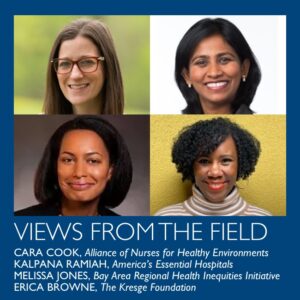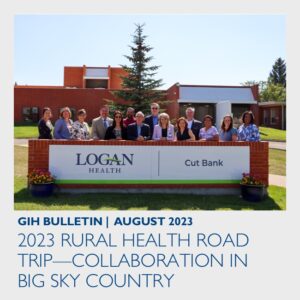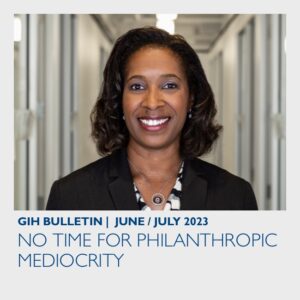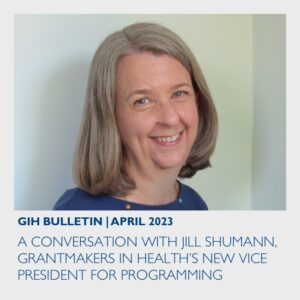GIH Bulletin: May/June 2025
After the 2018 Camp Fire – the most destructive and deadly wildfire in California’s history – the California Accountable Communities for Health Initiative (CACHI) understood that the community needed more than programming to recover. In response, the region’s Accountable Community for Health (ACH) was created – a community-rooted, cross-sector collaborative that invests in local leadership to shift systems, influence policy, and address both long-standing inequities and urgent crises.
GIH Bulletin: April 2024
In 2019, MacKenzie Scott announced that she was stepping into the world of philanthropy to give away her multi-billion-dollar fortune “until the safe is empty.” She has kept her word—to date, she has given away $16.5 billion. Her initial process for choosing which organizations would receive grants was shrouded in mystery. From 2019 to 2023, Scott used a process she termed “quiet research” to identify possible grantee organizations. The lucky organizations received a call from Scott’s consultants, who let them know they were receiving a grant for immediate use however they would like to spend it. In the Fall of 2022, Grantmakers In Health (GIH) became one of those grantee organizations, along with more than 20 health foundations. Two additional GIH Funding Partner organizations received gifts in 2020 and 2021, respectively.
GIH Bulletin: March 2024
The Horizon Foundation of Howard County, Maryland believes that everyone in our community deserves to live abundant and healthy lives. But there are barriers standing in the way of some of our residents—particularly people of color—from achieving that vision. We know that for too long, inequitable laws, policies, and practices have held back many of our neighbors. The foundation recently completed a 14-month long strategic planning process to figure out how to address these systemic barriers in a way that centers the voices of our community members who are most impacted. We realized that our work—what we focus on, who we engage with, and how we make decisions—needed to fundamentally change.
GIH Bulletin: January/February 2024
Trends in leadership are changing — just take the Terrance Keenan Institute as an example. When the program started in 2010, it focused on general leadership tactics with topics that ranged from leveraging resources and building partnerships to board dynamics. Since then, the Institute’s curriculum has moved towards a recognition that leaders possess individual strengths that can be embraced to make our organizations and the broader field of health philanthropy more effective.
GIH Bulletin: November/December 2023
Firearm injuries are a serious public health problem, killing more than 47,000 Americans each year and becoming the leading cause of death for children and teens in the United States in 2020. Given the impact and complexity of this health crisis, Grantmakers in Health (GIH) hosted a first-ever preconference session focused on firearm violence in advance of the June 2023 GIH Annual Conference on Health Philanthropy. Session speakers briefed partners on the causes of gun violence and provided an opportunity for health funders to learn more about potential solutions through a public health lens. This Issue Brief provides highlights of the meeting’s proceedings and previews GIH’s plans to convene a funder learning collaborative on firearm violence prevention to continue the peer learning and sharing that began at the preconference session.
GIH Bulletin: October 2023
Grantmakers In Health began 2023 by announcing an ambitious set of health policy priorities supporting four key goals—to advance health equity and social justice, to expand health care access and improve quality of care, to improve population health, and to promote community engagement and empowerment. Throughout the year, we aligned our work with our policy agenda, which was reflected in much of the programming at the 2023 GIH Annual Conference in Minneapolis, in our recent position statement on the 2023 Farm Bill, and in much of our other programming. Next week’s Fall Forum in Washington, DC, furthers GIH’s policy agenda, serving as a springboard for our continued engagement on policy in 2024.
GIH Bulletin: September 2023
When The Kresge Foundation’s Climate Change, Health and Equity (CCHE) initiative launched in 2018, community power mobilization was integral because too often the people closest to viable climate resilience solutions were excluded from decisionmaking. Since then, the leadership of CCHE’s community-based, health practitioner, and health institution partners has underscored the significance of community power to transform climate policy and public health practice.
GIH Bulletin: August 2023
It is hard to believe we are approaching the end of summer. It has been a bit of a blur, going from one conference to the next, and planning for fall meetings. For the second year since joining GIH, I was able to participate in our rural health road trip, an annual tradition started by the Federal Office of Rural Health Policy and National Rural Health Association in 2014.
GIH Bulletin: June/July 2023
More than a month after the 2023 Grantmakers In Health Annual Conference on Health Philanthropy, Advancing Philanthropy’s Commitment to the Long Game, I find myself reflecting on numerous aspects from presentations to conversations. Two quotes in particular have stayed with me, and apparently others, as I have heard one of them referenced at meetings I have attended since our conference.
GIH Bulletin: May 2023
President and CEO Cara V. James sat down with Jill Shumann, GIH’s new Vice President for Programming, to learn more about Jill’s long career in health and how her experience applies to GIH’s mission of advancing better health for all through better philanthropy. Jill discussed her formative years as a Peace Corps Volunteer, her work on international public health in Africa, and her recent tenure at the National Alliance on Mental Illness.

